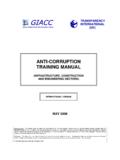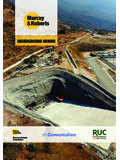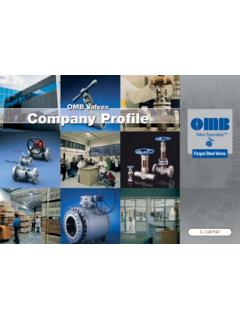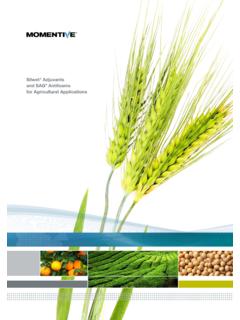Transcription of ISO 37001 Anti-Bribery Management Systems …
1 2016 1 ISO 37001 Anti-Bribery Management Systems Standard briefing Note 1. What is ISO 37001 ? ISO 37001 is an Anti-Bribery Management system (ABMS) standard for organizations. It specifies various Anti-Bribery policies and procedures which an organization should implement to assist it prevent bribery , and identify and deal with any bribery which does occur. It is published by the International Organization for Standardization (ISO), which is an independent, non-governmental international organization which develops and publishes International standards .
2 It is based in Geneva, and is made up of the national standards bodies from 162 member countries. 2. Who can use ISO 37001 ? ISO 37001 is designed to be used by small, medium and large organizations in the public, private and voluntary sectors. It can be used by such a wide range of organizations because the standard is designed to be a flexible tool, which can be adapted according to the size and nature of the organization and the bribery risk it faces. 3. In which countries can ISO 37001 be used?
3 ISO 37001 can be used in any country. It is designed to aid compliance by the organization both with international good practice and with the relevant Anti-Bribery legal requirements in all countries in which the organization operates. 4. How was ISO 37001 developed? ISO 37001 was developed by a Project Committee established by ISO in 2013. The committee comprised experts from the following participating and observing countries and liaison organizations. Participating countries (37): Australia, Austria, Brazil, Cameroon, Canada, China, Colombia, Croatia, Czech Republic, Denmark, Ecuador, Egypt, France, Germany, Guatemala, India, Iraq, Israel, Kenya, Lebanon, Malaysia, Mauritius, Mexico, Morocco, Nigeria, Norway, Pakistan, Saudi Arabia, Serbia, Singapore, Spain, Sweden, Switzerland, Tunisia, UK, USA, Zambia.
4 Observing countries (22): Argentina, Armenia, Bulgaria, Chile, Cyprus, Cote d Ivoire, Finland, Hong Kong, Hungary, Italy, Japan, Korea, Lithuania, Macau, Mongolia, Netherlands, New Zealand, Poland, Portugal, Russia, Thailand, Uruguay. 2016 2 Liaison organizations (8): ASIS, European Construction Industry Federation (FIEC), Independent International Organization for Certification (IIOC), International Federation of Consulting Engineers (FIDIC), IQNet, Organization for Economic Co-operation and Development (OECD), Transparency International (TI), World Federation of Engineering Organizations (WFEO).
5 Committee Secretariat and Chair: British standards Institution (BSI). The draft standard was circulated for international comment, and was modified at six international drafting meetings over three years to take account of international comments. Over 120 experts from over 20 countries participated in these meetings, which were held in London, Madrid, Miami, Paris, Kuala Lumpur and Mexico City. Decisions on the text were made by consensus of participating countries.
6 ISO 37001 was published on 15th October 2016. 5. What are the potential consequences if an organization gets involved in bribery ? From an organization s perspective, there are many potential adverse consequences if it gets involved in bribery , and which therefore justify the organization taking adequate steps to prevent bribery in relation to the organization s activities. a) Ethical factors: From an international and national perspective, bribery is now widely regarded as unethical and unacceptable.
7 It is one of the greatest obstacles to good government and the development of safe and adequate infrastructure. Funds which could be used for schools, roads, hospitals etc. are diverted by corrupt people for their private use. Safety and environmental procedures can be corruptly avoided, resulting in dangerous infrastructure and living conditions. Ethical organizations which are unwilling to bribe lose work to unethical organizations, which is unfair on ethical organizations, and may provide lower quality and higher cost solutions.
8 B) Legal risk: The international and national legal environment is rapidly changing, reflecting the increasing desire of people worldwide to prevent bribery . i) Many international treaties have been signed during the last 20 years requiring member states to implement Anti-Bribery laws and procedures. The most internationally significant of these are the United Nations Convention against Corruption (2003) and the OECD Convention on Combating bribery (1999). ii) Most countries have changed their laws in accordance with treaty requirements.
9 bribery and other corruption offences are therefore crimes worldwide. All OECD countries have now made it a crime for their nationals and organizations to bribe overseas. As a result, a person or organization may be liable for bribery both in the country where the bribery took place, and in the person or organization s home country. iii) Individuals and organizations can be held liable for bribery under both criminal law and civil law. The type and extent of liability will depend on the laws of each country.
10 Criminal laws can result in fines and imprisonment for individuals, and fines and debarment for organizations. Prosecution agencies in many countries are now starting to investigate and prosecute organizations and individuals for bribery . There have been many recent major cases. An organization may also incur criminal liability in several jurisdictions as result of new laws passed which make the organization responsible for bribes paid on its behalf or for its benefit by joint venture partners, suppliers, contractors etc.








